David Cameron meets Indian PM Manmohan Singh
- Published
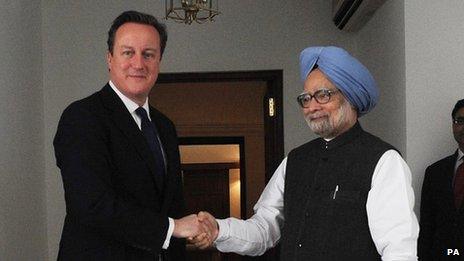
Mr Cameron is visiting Delhi ahead of the summit, which starts on Friday
UK PM David Cameron has met his Indian counterpart Manmohan Singh in a visit to Delhi ahead of the Commonwealth summit in Sri Lanka.
Mr Cameron reported on Twitter that the two leaders had made "extraordinary progress" on trade and investment since his first visit in 2010.
Ahead of the meeting, Mr Cameron had said he aimed to "cement Britain as India's partner of choice".
It is the prime minister's third visit to the country since taking office.
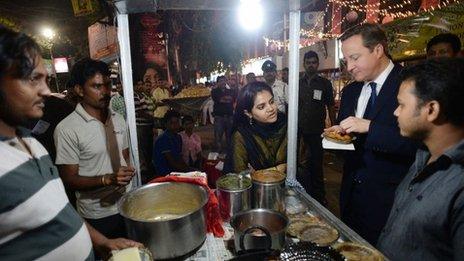
David Cameron tries snacks from a street food stall in Calcutta
He has said the UK is starting to "reap the benefits" of his push to secure trade deals with India, and sought to reassure Indian nationals about his drive to cut immigration to the UK.
Mr Cameron said he wanted to counter the "myth" that the immigration crackdown was "freezing out" new arrivals from the sub-continent, but he accepted there was a "challenge" to persuade people that the UK remains "open for business".
He has also said he is a "huge fan" of Indian cricketer Sachin Tendulkar, who is playing his 200th and final Test match before retirement.
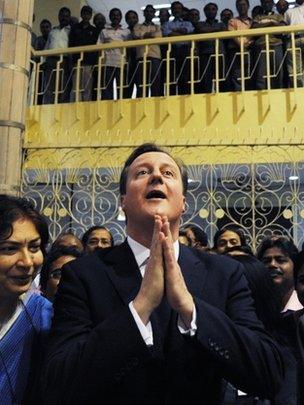
The PM meets staff at All India Radio
The PM said he regretted not being able to attend the farewell match on Mr Tendulkar's home ground in Mumbai.
But he sent a message to the record-breaking sportsman on a framed photo given to the "Little Master", saying: "From the first of 100 centuries to your 200th and final test - congratulations on a career that will inspire millions for generations to come."
Mr Cameron's party includes Conservative MP Priti Patel, whom he has appointed "Indian diaspora champion" with a remit to improve the government's links with British Indians.
He said the UK had "failed to make the most of what they have to offer" and he wanted them to "play a vital role forging this strong relationship".
Mr Cameron has unveiled a string of potential business deals between Indian firms and British companies during his visit, as well as plans for a British business centre in Mumbai to match those in Delhi and Bangalore
But the prime minister risked upsetting his Liberal Democrat partners in government when he told an audience of business leaders that being in coalition sometimes meant making compromises that were against the national interest.
"We have shown it can work," he told the group in New Delhi.
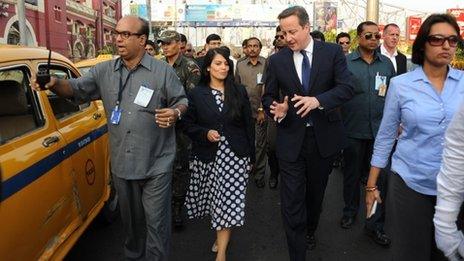
Conservative MP Priti Patel has been given the job of boosting the profile of British Indians
"There are some good parts to coalition. You have to proceed in quite a rational basis - that is good.
"I think what's bad about it is that sometimes you have to make compromises that are not necessarily in the long-term interests of the country."
Mr Cameron did not give any examples of decisions made by the present administration, but he said the British public shared his desire for "more decisive" government.
"I prefer a more decisive form of government," he added.
Deputy Prime Minister Nick Clegg hit back at Mr Cameron's criticisms, telling the BBC: "Clearly you need to make compromises in coalition government.
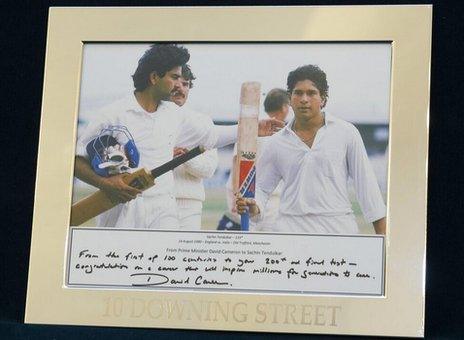
Mr Cameron published a photo of his retirement gift for Mr Tendulkar on Twitter
"I'm very proud of the fact that we've made the first proper coalition government in many many years in this country work.
"It's provided good, strong, stable government."
Any comprises, he added, had been taken "in the national interest", as for as his Liberal Democrat party was concerned, he added.
"For instance when the Conservatives suggested employers should be able to fire employees at will, we said, no, we didn't think it was in the national interest.
"When they suggested a 'Snoopers' Charter' we said no we didn't think that was in the national interest, or making profits in state-run and state-funded schools."
- Published14 November 2013
- Attribution
- Published14 November 2013
- Published19 February 2013